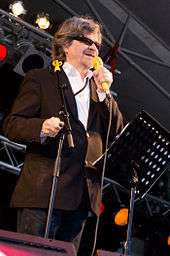M. A. Numminen
| M. A. Numminen | |
|---|---|
|
M. A. Numminen in 1987 | |
| Background information | |
| Birth name | Mauri Antero Numminen |
| Also known as | M.A. Numminen, La Kamarado, Ruotsin Kuningas, Viljo Kyttälä, Oriveden Kenkätehdas, Usko Suomalainen, E. Väline, Gommi |
| Born | 12 March 1940 |
| Origin | Somero, Finland |
| Genres | Jazz, tango, rock, schlager, children's songs, avantgarde, psychedelic rock, blues, progressive rock, techno, electronic music, hip hop |
| Occupation(s) | singer, musician, composer, author, producer etc. |
| Years active | 1963 –present |
| Associated acts | The Orgiastic Nalle Puh Big Band, Viisi vierasta miestä, Suomen Talvisota 1939–1940, Sähkökvartetti, Gommi ja Pommi, Underground Rock Orchestra, Riemu-Trio |
Mauri Antero Numminen, often known as M.A. Numminen, (born 12 March 1940 in Somero, Southwest Finland) is a Finnish artist, who has worked in several different fields of music and culture.
Biography
In the 1960s Numminen was known particularly as an avantgarde, underground artist, stirring controversy with such songs as Nuoren aviomiehen on syytä muistaa ("What a young husband should remember"; the lyrics of the song were taken directly from a guide to newly married couples, and included advice on foreplay) and Naiseni kanssa eduskuntatalon puistossa ("With my woman at the parliament house's park"). He was also a member of the band Suomen Talvisota 1939-1940. In his early days Numminen often tried to provoke people. Here he succeeded well, for example by his interpretations of Franz Schubert's lieder, sung with his own idiosyncratically creaking voice, or managing to create a scandal at the Jyväskylän kesä festival of Jyväskylä in 1966 with his song lyrics taken from a sex guide. Numminen also composed music to the writings of the philosopher Ludwig Wittgenstein. Numminen founded in 1966 with Pekka Gronow the record label Eteenpäin! ("Forward!"), which released Numminen's own music. Later, Numminen's records were published under the umbrella of the legendary Finnish label Love Records.
Numminen has been one of the unsung pioneers of Finnish electronic music, known for his collaborations with the composer and inventor Erkki Kurenniemi who built for Numminen a "singing machine" with which Numminen participated in a singing contest in 1964, and in the late 1960s the electronic instrument Sähkökvartetti ("Electric Quartet"), the performance of which wreaked havoc in a youth festival in Sofia, Bulgaria. Sähkökvartetti can be heard on Numminen's track 'Kaukana väijyy ystäviä' (1968).
In 1970 Numminen founded with the pianist Jani Uhlenius a jazz band called Uusrahvaanomainen Jatsiorkesteri ("Neo-Vulgar Jazz Orchestra"), which is still in existence; taking its cues from the 1920s-1940s jazz, swing, foxtrot, etc. Now retired from the band are the members Aaro Kurkela and Kalevi Viitamäki. The current line-up consists alongside Numminen and Uhlenius also of the accordion player Pedro Hietanen, the fiddler Jari Lappalainen and the bassist Heikki "Häkä" Virtanen.
In the 1970s Numminen became a popular favourite with his children's songs in the 1973 film Herra Huu - Jestapa Jepulis, Penikat Sipuliks, where he also played the main role, and in the 1977 TV series Jänikset maailmankartalle, where he played a hare. At the same time Numminen also gained success in Sweden with his song 'Gummiboll' (Numminen's Finnish version of this was called 'Kumipallona luokses pompin ain', and is an interpretation of the song "Rubber Ball" by Bobby Vee):[1] Numminen has recorded Swedish versions of many of his songs. He has also made several songs in English, German and Esperanto.
In 1989 Numminen released a black vinyl album, The Tractatus Suite, consisting of extracts from the philosopher Ludwig Wittgenstein's Tractatus Logico-Philosophicus set to music, on the Forward! label (GN-95). The tracks were "The world is all that is the case", [T. 2] "In order to tell whether a picture is true or false", [T. 4] "A thought is a proposition with a sense", [T. 5] "A proposition is a truth-function of elementary propositions", [T. 6] "The general form of a truth-function", and [T. 7] "Wovon man nicht sprechen kann" ("What we cannot speak about we must consign to silence"). It was recorded at Finnvox Studios, Helsinki between February and June 1989. The "lyrics" (quotations from the Tractatus) were provided in German, English, Esperanto, French, Finnish and Swedish.[2] The music was reissued as a CD in 2003, M.A. Numminen sings Wittgenstein.[3]
Lately Numminen has made a return to electronic music and modern club sound. In 2003 Numminen started M.A.N. Scratch Band featuring his long-time collaborator Pedro Hietanen with young jazz musicians Olavi Uusivirta, Lasse Lindgren and DJ Santeri Vuosara (also known as DJ Sane). The duo M.A. Numminen & DJ Sane was started in 2004.
Numminen has appeared on Radio Suomi since 1984 together with playwright Juha Siltanen on their night show Yömyöhä. In 1986 he published a book called Baarien mies ("The Man of the Bars") on Finnish keskiolut lager culture, for which he visited 350 bars around Finland. The book had a considerable role in the birth of 1980s keskiolut beer culture in Finland.

Numminen has taken part in over 30 films, either as an actor, scriptwriter, composer or cinematographer.
Compilations discography
- Uudet lastenlaulut 1 (1974)
- M.A. Nummisen suosituimmat (1974)
- M.A. Nummisen 60-luku (1985)
- Den flygande mannen (EMI 1985)
- The Tractatus Suite (Forward! 1989)
- Klassikot - Ne Parhaat (Castle Finland 1990)
- Den eviga årgången - M.A. Numminens bästa (Amigo 1990)
- Suosituimmat lastenlaulut (EMI 1998)
- Kiusankappaleita 1: 1966-70 (Siboney Records 2000)
- Kiusankappaleita 2: 1973-88 (Siboney 2001)
- Kiusankappaleita 3: 1989-2001 (Siboney 2001)
- Dägä Dägä Finnwelten (Trikont 2001)
- Valtava Jänis – Gommin ja Pommin kaikki seikkailut (EMI 2002)
- Suomihuiput – lastenlaulut (EMI 2005)
- M.A. Numminen sings Wittgenstein (Zweitausendeins EFA SP 142 2003)
- Tunnelmassa - M.A.Nummisen Uusrahvaanomaisen Jatsiorkesterin parhaat (Love Records 2012)
Bibliography
- Kauneimmat runot 1970
- Lastuja 1971
- Satuja 1975
- Jänikset maailmankartalle! 1977
- Terässinfonia (together with Esa Saarinen) 1981
- Passio Libertatis 1983
- Baarien mies 1986
- Kirjeitä virolaiselle runoilijalle 1987
- Etsivätoimisto Andrejev & Milton (together with Markku Into) 1991
- Tango on intohimoni 1998
- Helsinkiin 1999
- Der Weihnachtsmann schlägt zurück 2001
- Naapuri (together with Markku Into and Jarkko Laine) 2002
- Rehtorin päiväkirja – Interaktiivinen kalenteri vuodelle 2004 2003
References
- ↑ "Gummibollen rullar ständigt in". Gefle Dagblad. 17 February 2011. Retrieved 18 February 2017.
- ↑ "M.A. Numminen – The Tractatus Suite". Discogs.com. Retrieved 16 March 2015.
- ↑ Numminen, M. A. (2003). "M. A. Numminen Sings Wittgenstein. EFA SP 142". Zweitausendeins.
